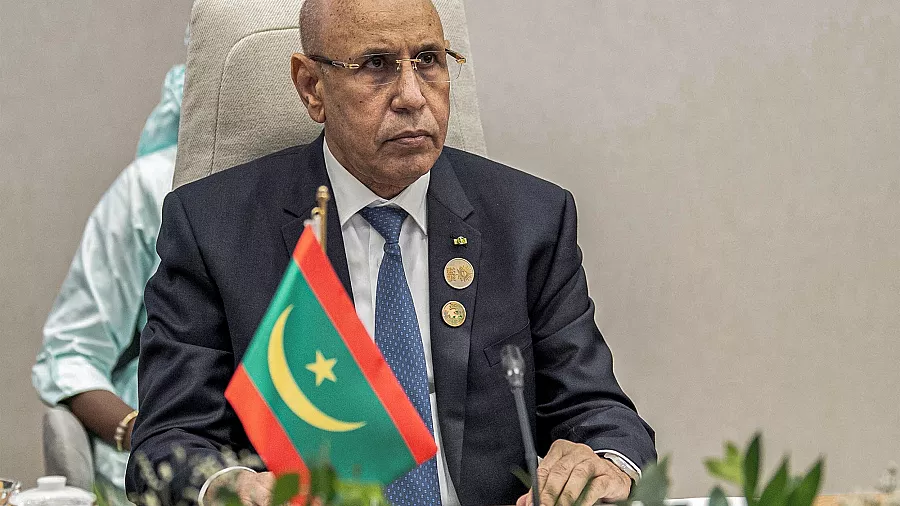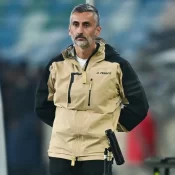
At the height of the mining and energy boom, Ghazouani is running for reelection in Mauritania
In an attempt to defeat six opponents in the June 29 presidential election, President Mohamed Ould Ghazouani of Mauritania has pledged to increase investments in order to fuel a mining and energy boom.
Investing more in mining and energy might strengthen Mauritania’s economy and maintain the 67-year-old former army chief’s position as head of the soon-to-be gas producing nation.
The ruling party’s dominance in the West African desert nation makes Ghazouani a favorite to win, but he will have competition from anti-slavery activist Biram Dah Abeid, who finished second in the 2019 election with more than 18% of the vote.
The Greater Tortue Ahmeyin (GTA) offshore gas project, which straddles Mauritania and Senegal, is being operated by BP (BP. L). This puts the producer of iron ore, gold, and copper on track to become a gas producer by the end of the year.
The GTA project is 7% owned by Mauritania, which is currently searching for developers for its offshore gas deposit, BirAllah, which has an estimated 60 trillion cubic feet of gas.
If re-elected, Ghazouani has pledged to build a gas-fired power plant from the GTA, expand mining for gold, uranium, and iron ore, and invest in renewable energy.
The Tewassoul party’s Hamadi Sidi El Mokhtar, neurosurgeon Otouma Soumaré, economist Mohamed Lemine El Mourtaji El Wafi, and attorney Id Mohameden M’Bareck are among the other contenders in the race.
Despite opportunities for development, Mauritania, which is home to less than 5 million people and is four times the size of the United Kingdom, faces pervasive poverty and is currently managing an influx of tens of thousands of migrants from neighboring Mali.
The EU has committed more funding to assist Mauritania in reducing irregular migration, as it serves as a transit route for migrants en route to Europe.
Abeid is criticizing Ghazouani for his record on human rights and the exclusion of Black Africans from Mauritania.
According to a UN study from 2023, even though slavery was outlawed in 2007 and eliminated in 1981, there are still instances of slavery in some regions of the nation.
According to rights organizations, tens of thousands of Black Mauritanians are still held as domestic slaves, typically by lighter-skinned Arab or Berber masters.
APPROPRIATE STABILITY
Since 2019, Ghazouani has presided over a period of comparatively calm conditions while neighboring countries in the Sahel, such as Mali, have struggled with Islamist insurgencies that have resulted in military coups. In recent years, Mauritania has not reported any militant attacks on its territory.
Ulf Laessing, chairman of the Konrad Adenauer Foundation’s Sahel program, said, “Mauritania has a more professional army with an effective presence on the ground.”
Mauritania has accepted assistance from nations like France and has remained a Western ally in the conflict with Islamists in the area. On the other hand, junta-led Mali, Burkina Faso, and Niger have rejected Western forces and turned to Russia for military assistance.
Currently serving as the chair of the African Union, Ghazouani made a campaign-tour commitment to handle threats from extremist groups.
The country’s medium-term debt profile might get worse if the GTA project is delayed, according to the International Monetary Fund, which predicts economic growth of 4.3% this year compared to 3.4% in 2023.
Two of the most important problems for the 2 million registered voters in the nation are combating corruption and distributing natural resources fairly.
Civil society activist Sidha Mint Yenge stated, “Mauritania needs decentralized management which promotes each of the 15 regions of the country.”
The ability to find employment is crucial for young people, according to student Hawa Boubacar Traore, a 23-year-old.
“These elections are an opportunity for young people to show civic commitment with a demand for transparency,” she stated.
All Categories
Recent Posts
Tags
+13162306000
zoneyetu@yahoo.com



